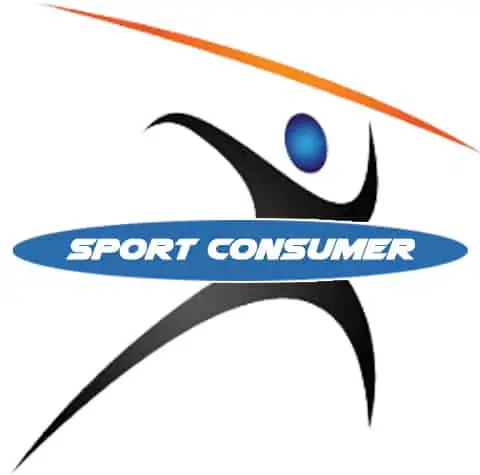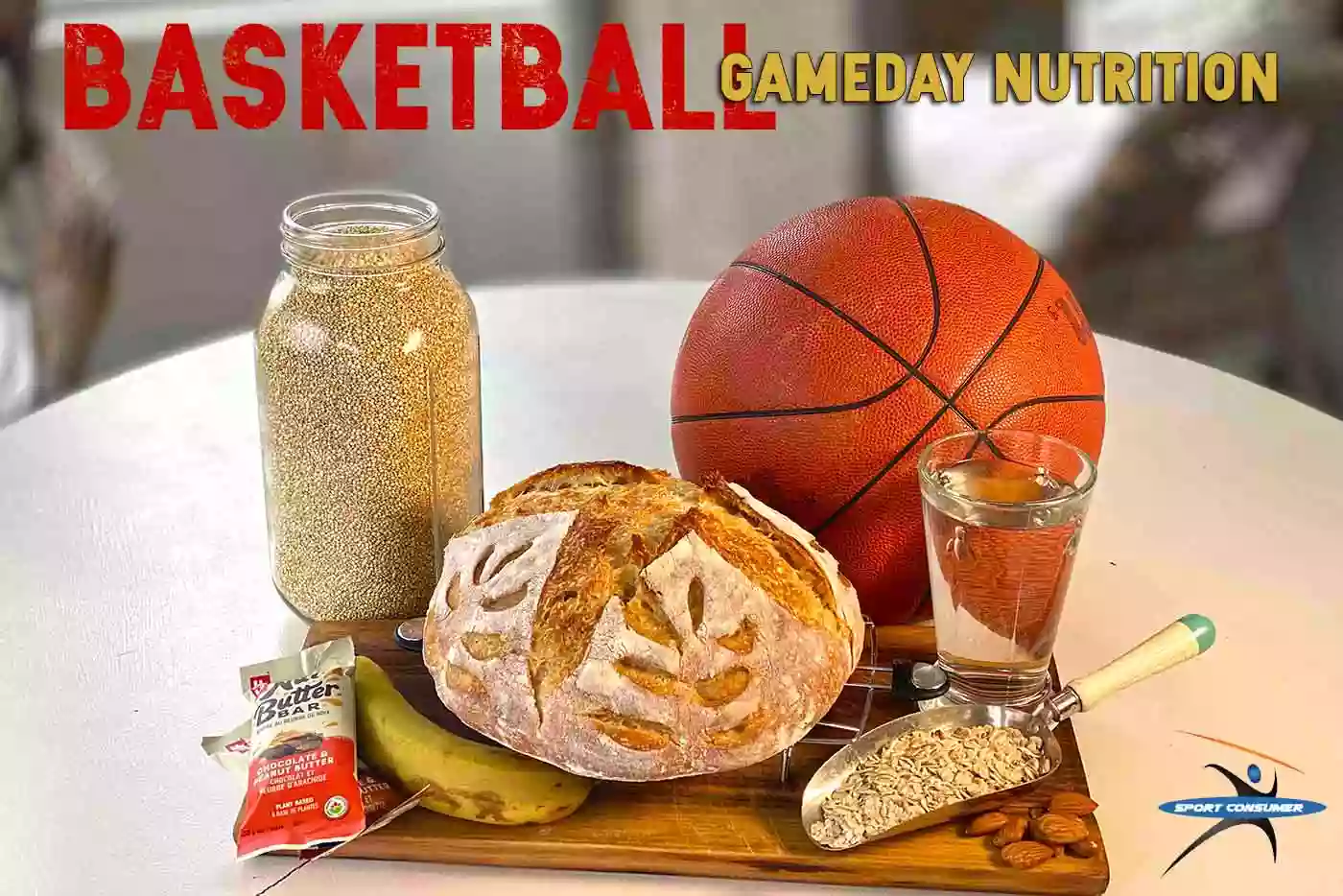What Should An Athlete Eat Before a Basketball Game?
As a high school and collegiate athlete in many sports, the question of what to eat before a game is no mere afterthought to me.
I’ve made the mistake of eating the wrong food at the wrong time, and I’ve paid the price in poor performance and long recovery times.
I’ll get into the details later, but as a quick summary, a great choice for a pre-game food for a basketball player would be pasta, peanut butter sandwiches, banana, protein shakes, and a variety of other fruits.
Remember, that everyone reacts differently to different foods, and metabolisms (not to mention personal taste) will play a big role in determining what foods are best-suited for you.
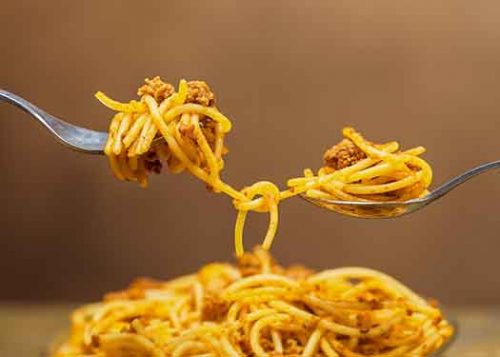
Should I Eat Differently on Game Day than Regular Days?
While you can search this topic endlessly and even consult a dietician, there’s enough information out there (including dieticians’ and experienced athletes) that can offer you some excellent insight into what you should eat in general, whether it’s game day or not.
Ryan Turner is a Sports Dietician at new York University, and he tells us:
“Pre-game nutrition should be viewed as supplemental to the fueling you do throughout the rest of the day. Depending on your sport, you should be able to enter the game with enough stored energy for a full 60 minutes.”
As a rule, my experience and research has taught me that game day diets are similar to practice day diets which are not that different than any other day.
There, I said it! But, having said that, there are some specific guidelines as the hours and minutes approach to game or practice time. Let’s unpack it a bit more!
First, the Headlines – What Are the Main Elements My Body Needs?
We’ll talk about the details later, but here’s the big picture! Whether you’re a pro basketball player or an elementary school kid, your body is craving two crucial elements most of the time – but especially before a game or practice.
Those elements are Carbohydrates (carbs) and Water. Pretty simple huh?
Not so fast. You can get lots of carbs with candy and sodas, and there’s lots of water in that Pepsi isn’t there? Yup! So there’s a good way and a bad way to get your water and carbs.
If you load up on carbs that have lots of fat and low vitamin content, you’ll suffer through the game and you might even get benched if you’re a starter!
Pre-Game Meals
The idea here is to get adequate carbohydrates that will fuel your body, and proper hydration, while minimizing sugars and fats and high-fiber foods that slow digestion.
The reasoning here is that while carbs are not necessarily sweet, they do turn into sugar (ie. bread is a common example) and that sugar is, in turn, used as energy for your muscles.
The process of carbs turning into sugar/energy takes time and that’s what we want. If you drink a soda, its carbs do not take as much time to break down so you’ll burn through those quickly (like a fire on newspaper).
But the pasta will be more like a fire, burning hardwood logs – takes longer and therefore offers a protracted energy window.
Be sure to minimize added sugars and fats, so no Twinkies and no fries! I’d suggest staying away from lots of sauces, gravies, spreads, etc. because of the added fat and sugar. The more simple and clean the meal, the better off you’ll be.
Oh, and don’t eat this meal less than 2 hours before a game (I usually do it 4 hours before a game) or you’ll be likely to get cramps in your stomach.
This is NOT a meal to pig out on. It’s just to make you feel generally satisfied. Eat too much carb and you may want to take a nap!
Pre-Game Meal Math!
For you techno-types who would like a bit more detail on how much to eat and when here’s an excellent formula used by some dieticians and sports nutritionists:
(body weight in kilograms) x (hours prior to competition) = grams of carbohydrate
So, for example, a player weighing 75 kg (165 lbs) and eating 2 hours prior to the game could eat: 75 kg x 2 hours = 150 grams of carbohydrate.
This would be kind of like eating a turkey sandwich, an ounce of pretzels, and a granola bar, along with a large glass of water.
Here’s a general outline of what might be a good sample menu and the timing involved. The outline is compiled from my own decade of competitive basketball experience as well as some well know sports dieticians like Ryan Turner RD, CSSD, CDN:
2 Hours (or a bit more) Before the Game
Higher carbohydrate-oriented meals are in order, and they should be starch-based as well. Here’s a great list you can use to get started:
- Pasta (the favorite with many athletes)
- Low Fiber Rice
- Whole Grain Bread
- Oats
- Baked Potato
- Tortillas
- Quinoa
- Lots of WATER
1-2 Hours Before Game Time
I usually don’t feel much like eating, but if you must, this would be a good time for something like:
- Low fat turkey sandwich (half)
- CLIF bar
- LaraBar
1 Hour or Less Before Tip-Off
I like to stick with water at this point after having eaten my pre-game meal earlier, but now would also be a good time for hydrating using fruits like:
- Watermelon
- Grapes
- Oranges
NOTE: Remember, high-fiber carbs/foods will digest a lot slower and you don’t want that 60 minutes before a game or practice. Stick with low-fiber at this point, like crackers, pretzels or even a piece of white bread.
Between Basketball Games at a Tournament
If you have an hour or more between games, Ryan Turner suggests a small snack that can include foods like:
- Peanut Butter (and jam) Sandwich
- Cereal Bar
- Bagel and butter
- Protein bar or balls
- Low Fat Greek Yogurt with cereal
- Oats or Oat Bar
- Water, water, water …. or
- 8 – 16 ounces of a sports drink (go easy on sports drinks since they contain sugar)
A Note About Water from the Director of Sports Nutrition at Tone House in New York!
Ryan Turner RD, says this about the importance of water, so read carefully and keep a bottle with you ALWAYS (except when you’re actually on the court);
“If an athlete loses more than 2% of their body weight from sweat, decision making and reaction time is slowed, perceived exertion is increased, and lean muscle is compromised. The average person loses 2.4 pounds from sweat per hour—it’s important to hydrate throughout the day and well before competition so you aren’t overloading your stomach.”
Turner warns about sports drinks or juices (even watered-down juices). He says that while drinking such beverages can help in energy or recovery, too much concentration of sugar can cause cramping or worse!
I’ve always had an issue with being told to drink water when I’m not thirsty since that makes me gag and it doesn’t make sense to me.
I mean, our bodies usually tell us if they’re hungry or thirsty, and I figure that would be a good time to either eat or drink accordingly.
However, most dieticians and sports nutritionists agree that there is a place (especially during competitions) that drinking at least some water intermittently even when you’re not thirsty, is a wise precaution to avoiding the consequences of dehydration.
Nutrition During a Game
Basketball games can last typically around 40 minutes of actual playing time, depending on the league.
The good news regarding mid-game nutrition is that most likely, your energy (aka glycogen or sugar in your muscles) will not be depleted during the game even if you play more minutes than anyone else on your team.
Having said that, it’s important to note that lots of studies have been done on athletes to show performance levels throughout a basketball game (and especially into the 4th quarter) based on nutrition intake vs. a placebo.
The studies show that supplementing with a carbohydrate of some sort during the game is likely to extend higher performance levels to include late-game play.
This same research shows us that speed and cognition are maintained during a basketball game in those athletes that supplement with carbohydrate intake during the game.
It should go without saying that during a game (ie. while you’re on the bench in the gym) it’s not practical to actually eat a sandwich or any other snack most of the time.
So, the most beneficial and practical source of carb supplementation is a sports drink like Powerade or Gatorade. Another great option would be a sports gel or a sports chew.
If you’re active during the game, a great portion target for an adult basketball player would be 30-60 grams of carb per hour. However much sports drink you can comfortably consume during that time, is likely just about enough to cover that requirement.
Hydration During a Game
Here’s some great news! There’s a lot of science dedicated to sweat rates and how to determine them. This process is a bit more advanced and technical than most recreational or even collegiate athletes need to worry about.
This article won’t cover that since we’d like to equip you with just the right amount of information you need to fuel yourself efficiently and safely.
Also, basketball lends itself well to drinking water or sports drinks with its numerous breaks in action like timeouts, between quarters, etc.
So, let’s summarize what you need to know. Sports nutritionists agree that consuming hydration during a game is crucial.
Water is typically adequate for most athletes, though sports drinks may be better for higher-performance athletes or athletes who tend to sweat excessively of find themselves losing energy during a game.
Every athlete will have a different metabolism that uses and loses water at a different rate, so I won’t give any measurements or quantities.
A good rule of thumb is to drink whenever you feel like it, and it sure helps to have a water fountain or team water container nearby.
The only guideline I’ll give you for now is this; If you lose more than 2% of your total body weight at the end of a game, you didn’t drink enough.
You need to increase your fluid intake next time by approximately 10 oz to 20 oz PER POUND of body weight lost.
So, if you’re a 170 pound basketball player and at the end of a game you weigh 166.5 lbs, then you should aim to drink an additional 50 ounces of water during a game.
That’s what the science says though I’ve always been one to drink less than what I should during and after a game!
Should You Eat During Halftime?
Well, the answer here depends on you! If you feel low on energy, it’s not the worst thing in the world to grab something to eat quickly.
According to sports nutritionists, at this point in the game, it’s not a bad idea to drink an electrolyte-filled sports drink, since you’ll need the energy that comes from sugar pretty quickly, and it will also help restore the depleted elements in your body.
Fruit (fresh or dried) can also be a good addition, but for a typical basketball game, I’d stick to the sports drink.
Some NBA players have been known to grab a small sandwich or crackers during halftime, but most don’t eat anything.
AFTER the Game
Nearly as important as your pre-game meal, is your post-game recovery meal. Most experts agree that eating a meal within the first hour after a game will optimize your recovery time.
That can be a hard task to accomplish if you’re at the gym and you still need to shower, get dressed, have a post-game meeting, then travel home, and then prepare a meal.
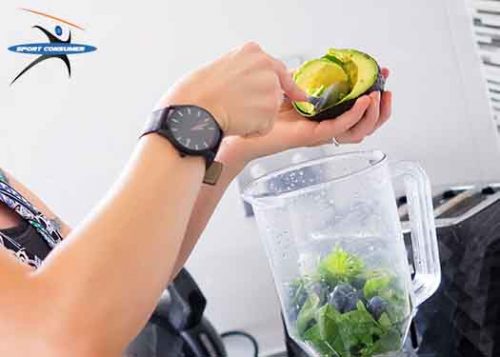
So, even within the first 2 hours after a game, a proper meal with the right foods will help a whole lot towards an optimal recovery. What are the foods you should eat after a game?
Well, you’ll want to focus on lean protein, healthy carbs and good hydration. Here are some great examples:
- Rice with salmon or tuna (or you can substitute some bread or a bun instead of the rice)
- Turkey burger and bun
- Chicken Burrito
- Salad with kale/spinach and lots of beans (protein)
- Whey proteins shake
- CLIF bar
- Lean Beef stir fry with lots of vegetables
- Bananas
- Sweet potatoes
- Vegetable (mixed with fruit) shake with little fat, or healthy fats from fruits like Avocado
A recent study in the Journal of the International Society of Sports Nutrition acknowledges that it can be hard to eat after a game as appetite is often suppressed during a stressful event. They say:
“However, appetite can sometimes be suppressed following high-intensity exercise so liquid supplements can be provided as an alternative for players who cannot eat solid foods. In this respect, whey protein has proven to be a superior source”
That means a high-quality protein shake can definitely be a part of your nutrition regimen.
What Do Pros Eat on a Regular Basis?
Lots of professional athletes in the NFL, NHL, and NBA will eat many of the foods you and I eat.
Breakfasts often include eggs and toast, oatmeal or fruit smoothies, while later meals include lean meats like chicken and fish, as well as salads, wraps and pastas.
Remember, you can eat all these things in a good format or a bad format. For example, you can have white refined bread with a sugar-filled smoothy, or you can have a whole grain sourdough bread with an organic fruit-filled smoothy with no sugar.
It’s best to stay away from the stuff you already know is worse for you and stick with the good options you know are healthier.
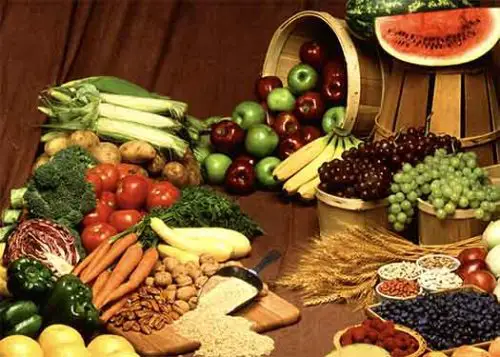
Overall Approach to Diet for Competitive Athletes
In addition to all we’ve covered about pre-game and post-game nutrition, here are some excellent ideas to help you create your own protocol for pre-game, mid-game, post-game and general daily nutrition;
- Carbohydrates from fruits/vegetables and grains is what your body would like for energy DURING basketball games or practices.
- Pregame meals should always be high in complex carbohydrates (pasta, whole grain bread, etc.) and not simple carbohydrates (candy, soda, chocolate bar).
- If you have a day or less between basketball games or competitions, you should focus on recovery nutrition. Carb intake of 1 – 2 grams per kilogram of bodyweight along with 20 grams of protein will help restore proper nutrition for your muscles.
- According to the general consensus between sports nutritionists, on a regular basis, the daily diet of a competitive basketball player should be around 5 – 10 grams per kilogram of body weight. The variation here is based on the annual timing of the pre-season, season and post-season).
- Protein (lean) is crucial to build and repair muscle. Basketball players should focus on getting 1.4 – 1.7 grams per kilogram of body weight per day. This amount is mostly obtained through a healthy diet and not via supplementation.
- Fats are important for cell membrane development and a functional immune system but most athletes get enough fat from a healthy diet. Focus on heart-healthy fats like salmon or oils like flax, avocado, coconut or olive oil.
A Great Sample Menu (for a 160 – 180 pound basketball player)
In case you’d like a bit more specific direction to start your own meal planning for basketball, we’ve come up with a very general sample menu for an average-sized male athlete at the high school/collegiate/pro level.
Remember, everyone’s metabolic requirements are at least a little bit different if not a lot, so you’ll want to experiment a bit.
Breakfast:
- 2 cups of cereal like shredded wheat or Total, with 8-12 ounces of skim milk or Almond/Macadamia milk.
- 1 banana
Snack:
- Handful of pretzels
- Apple
- A small handful of almonds/peanuts
Lunch:
- Lean meat (turkey) sandwich with whole wheat bread
- 8-10 baby carrots or any equivalent sized vegetable
- Granola bar
Pre-Practice (afternoon) Snack:
- Energy bar
- 20-ounce sports drink
Supper:
- Tossed Salad (include high-value items like spinach and kale rather than lettuce)
- 2-4 cups of pasta (spaghetti) with minimal sauce
- 2-3 pieces of garlic toast
- 12 ounces of skim milk or nut milk
Evening Snack:
- A 12-ounce banana and strawberry/raspberry/pineapple smoothie
You can complicate things a lot more by adding in a variety of supplements and specialty foods. Howe,
But the more you do that, the less sustainable it becomes due to planning/shopping/logistic problems given that you have a lot more to worry about in your life than the exact timing and size of every meal and snack during the day.
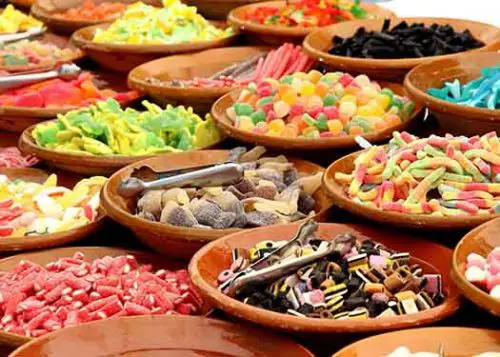
What Foods Contain Carbohydrates, and How Much?
We’ve talked a lot about carbohydrates (complex and simple) and we’ve stressed that an active, competitive basketball player needs to eat a diet rich in carbs.
This is not actually that difficult, since nearly every food has carbs (yes, even vegetables). But, you’ll want to steer away from simple carbs like refined sugars and sweet juices.
So, we thought might be helpful to give you a bit of a list of some popular foods along with how many carbs they have.
- Typical Sports Drink (20 oz) – 35 g
- Banana – 25 g
- Granola Bar (x2) – 30 g
- English Muffin – 25 g
- Bagel – 45 g
- 1/4 cup raisins – 30 g
- 1/2 cup cooked pasta – 20 g
- 1 cup long grain rice – 60 g
- 1/2 cup frosted mini-wheats – 20 g
- 1 cup puffed cereal – 10 g
- 1 cup Cheerios – 20 g
- 1/2 cup beans – 15 g
- Baby Carrots (8) – 05 g
- Baked Potato (medium) – 30 g
- Avocado – 15 g
- Orange Juice (1/2 cup) – 15 g
- Fresh Strawberries (10) – 05 g
- Pogo Corndog – 20 g
- Taco (small) – 25 g
- 1 cup Rice Milk – 25 g
- Premium Plus Crackers (4) – 10 g
- 1/2 cup Trail Mix – 35 g
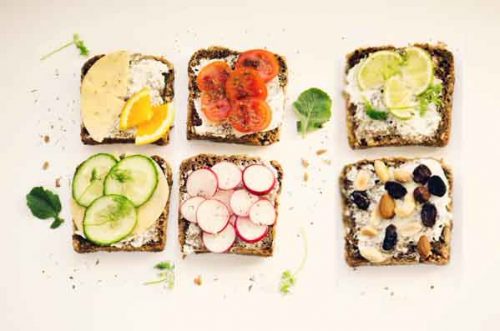
Takeaway
There’s a fine line between being too full during a game which means your body is using energy to break down the foods, which leaves you with less energy for the game, and not having enough energy for the whole game.
You’ll need to experiment a bit and everyone’s nutritional intake will be different since we’re all different sizes and have different metabolisms, etc.
Sources:
Ranchordas, M.K., Dawson, J.T. & Russell, M. Practical nutritional recovery strategies for elite players when limited time separates repeated matches. J Int Soc Sports Nutr 14, 35
Silva, A.M., D.A. Santos, C.N. Matias, C.S. Minderico, D.A. Schoeller, and L.B. Sardinha (2012). Total Energy Expenditure Assessment in Elite Junior basketball Players: A validation study using double labeled water. J. Strength Cond. Res. 27:1920-1927
Phillips S.M. and L.J. Van Loon (2011). Dietary protein for athletes: from requirements to optimum adaptation. J. Sports Sci. 29 Suppl:S29-38.
Welsh, M.D. Carmichael, E.A. Murphy, and J.A. Blackmon (2005). Carbohydrate feedings during team sport exercise preserve physical and CNS function. Med. Sci. Sports Exerc. 37:306-315.
